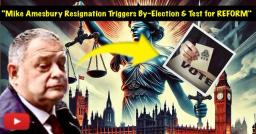WILL POLITICAL EARTHQUAKES ROCK LOCAL ELECTIONS TODAY?
Labour’s punch-up, Reform’s meltdown, and Runcorn’s revolt—Britain’s most explosive Local-Elections in recent years could blow the whole 2029 election wide open.
It’s that time of year again. The political equivalent of bin collection day—necessary, neglected, and generally noticed only when it doesn’t happen. Yes, local election day is upon us once more, and while the nation collectively ispretends it understands what a Police and Crime Commissioner actually does, the more observant among us will notice something peculiar in the air today—mild anticipation mixed with the pungent whiff of public disillusionment.
Across England, voters—or more precisely, a fraction of voters—are heading to the polls to decide who will control local councils, set bin schedules, approve speed bumps, and, more importantly, act as the electorate’s temporary therapy dogs for frustrations far beyond their remit. But let’s not pretend this isn’t, in essence, a proxy war for Westminster. These elections, while draped in the local, are soaked in the national.
One can’t help but marvel at the current state of political engagement in this country. Turnout figures in some wards are expected to hover somewhere between ‘concerning’ and ‘statistically irrelevant’. At this point, the average garden snail shows more civic engagement crossing a footpath than half the electorate do at the ballot box. And yet, despite this democratic apathy, the complaints roll in uninterrupted—council tax, potholes, crime, immigration, schools, and the sacred, often mythical, 20-minute ambulance response time. All apparently matters of burning importance, right up until someone is asked to vote on them.
Which is exactly the problem.
Not voting, in 2025, is less a passive act and more an active abdication of responsibility. If the ship’s going down, refusing to pick a lifeboat isn’t noble neutrality—it’s just being awkward. And let’s be clear: the ship may not be sinking just yet, but there’s an undeniable tilt, and a noticeable shortage of competent stewards.
What makes today’s local elections especially curious is that this year, it seems, more and more voters are reaching for the lifeboats marked Reform UK and Conservatives, not necessarily out of admiration, but out of sheer and escalating disdain for what the Labour Party has become—or hasn’t become, depending on your angle. Sir Keir Starmer’s rebrand of Labour has left many wondering whether they’re voting for a vision or a vacuum with a QC. The party may be ahead nationally, but on the doorstep—especially in traditional heartlands—there is the unmistakable chill of reluctance rather than enthusiasm.
That’s not to say the Conservatives are sweeping through the polling stations in golden chariots. Quite the opposite. They limp toward these elections with the grace of a retired boxer re-entering the ring for one last payday, bruised but battle-hardened, and—if some recent by-elections are anything to go by—unexpectedly punching above their weight.
Then there’s Reform. The political party formerly known as a pressure group formerly known as a fringe movement, now holding enough disillusioned voters in its orbit to make seasoned MPs glance nervously at their majority. The Reform effect is no longer theoretical. They are fielding candidates in places they were once laughed out of and drawing support from the kind of voters who used to mutter their political views only after checking over both shoulders.
All of which brings us to the battlegrounds to watch tonight. Bolton, County Durham, Hull, and Greater Lincolnshire—names that once sounded like regional railway stops now carry real political weight. These areas are fertile ground for change, where the Conservatives are hoping to hold, Reform are pushing for major breakthroughs, and Labour are desperate to avoid haemorrhaging support. Similarly, the newly created mayoral contests in Hull & East Yorkshire and Greater Lincolnshire, alongside key votes in Doncaster and South Yorkshire, are expected to serve as vital bellwethers for the national mood—though ‘mood’ here might generously be defined as ‘resigned tolerance spiked with occasional profanity’.
But despite all this noise, the only result that truly matters is this: did you vote?
Did you make the decision, however begrudgingly, to choose between the imperfect options on offer? Because here’s the uncomfortable truth—someone will be elected. Whether it’s a three-time incumbent, a first-time Reform rebel, or a Labour candidate whose primary campaign message was “Well, we’re not them,” someone will take office. The only question is whether that someone earned your vote or simply benefited from your silence.
We at Video Production News, much like our readers, are not in the business of telling you whom to vote for. But we will say this: vote for someone. Vote for anyone who most reflects your convictions, your concerns, and—if nothing else—your bin collection preferences. Because in the great messy experiment that is local democracy, inaction isn’t neutrality. It’s surrender.
And with the polls now open and turnout already looking less than promising, tonight’s results are likely to yield not just victors and vanquished, but also more of the political absurdity we’ve come to expect from the great British ballot box.
As to one particularly interesting constituency result that may offer the real insight into just how much the ground is shifting—that, we discuss next.
The 2025 Runcorn and Helsby Parliamentary Constituency By-Election
So, to the political powder keg masquerading as a by-election: Runcorn. Once the sleepy satellite of Warrington and a town best known for its chemical plants and soul-devouring ring road, today it has found itself in the full glare of national attention. Not for its vistas. Not for its infrastructure. No. For the by-election so volatile, even the returning officer’s pen has allegedly developed a nervous twitch.
Yes we have arrived at the political battleground of the day, the arena everyone’s watching—a town that’s suddenly found itself promoted from “Cheshire Curiosity” to the frontline of Britain’s political drama. Today’s by-election isn’t just a ballot—it’s a barometer.
Reform UK and Labour are neck and neck, with the most recent polls putting them virtually level, both teetering around 31–33%, and the Conservatives panting somewhere behind in the high teens, like a middle-aged jogger who accidentally entered a marathon. But it’s not the numbers alone that have Runcorn under the microscope—it’s the scandal, the strategy, and the sheer theatre of it all.
Let’s start with Labour. The party’s original candidate had to be removed, not due to an unfortunate tweet from 2009, nor some long-lost university essay about Trotsky, but for something far more 2024—assaulting a constituent on video during the campaign. Yes, a real-life incident of good old-fashioned electoral violence, complete with grainy footage and a public outcry. Not exactly “For the many, not the few”—unless the few are flat on their backs.
This last-minute disqualification forced Labour into damage control mode. Their new candidate is best described as… present. A man of such dazzling anonymity that even the clipboard he’s holding seems more charismatic. Labour HQ might be praying that voters forget who’s standing and just tick red out of muscle memory.
Then there’s Reform UK. Oh, Reform. Never ones to shy away from a public relations own-goal, they recently treated one of their only widely liked political figures—Rupert Lowe—with all the warmth of a tax audit. Having publicly cut ties with Lowe over some classic “says what he thinks” moments, Reform may now be wondering whether alienating the one man who could articulate their policies without frothing at the mouth was the best play. And somewhere, quietly, behind a blue tie and a wry smile, the Conservative Party is probably drafting Lowe a “welcome back” card, just in case.
Because the real taboo in Reform circles right now—the one nobody wants to say out loud—is whether Rupert Lowe might rejoin the Conservatives. And if he does, dragging chunks of the Reform vote with him, it would not just dent their ambitions—it would publicly expose the kind of internal disarray that gives donors indigestion.
As of early afternoon on polling day, the turnout in Runcorn has been steady if unspectacular. Voters appear cautious, considered, perhaps quietly weighing up whether this is a battle between parties, personalities—or a protest in search of a vessel. Reform are throwing everything at this. Their leaflets are everywhere, their activists prowling like hawks. They need this one. Not want. Need. A win here offers legitimacy beyond Farage’s eyebrows on GB News. A loss would confirm every private whisper that they’re not quite the machine they claim to be.
The Conservatives? They’re not fully out of the race, but they’re running a distant third, doing little more than hoping for an implosion up ahead. Their candidate is performing with the cautious optimism of someone who knows they’ll be applying for a council seat come Monday.
Every political operator from Basildon to Blyth is watching this seat like it holds the nuclear codes. If Reform win, it confirms the working-class right-leaning revolt is alive and sharpening its pitchforks. If they lose—especially after jettisoning a popular candidate for daring to speak like a real person—it could spark a crisis of identity the party is in no shape to manage. And if the Tories somehow win? Well, that would raise an entirely new set of questions...
And yet… one suspects there’s more drama to come in this saga. Because if you think today’s headlines are something, just wait until the results roll in. But that, my friends, is a story all of its own!
Well, that’s all for now. But until our next article, please stay tuned, stay politically informed, but most of all please vote, and I’ll see you then.




